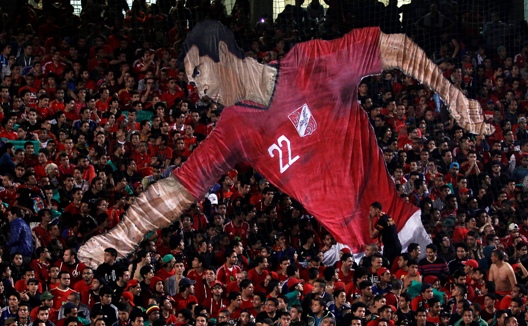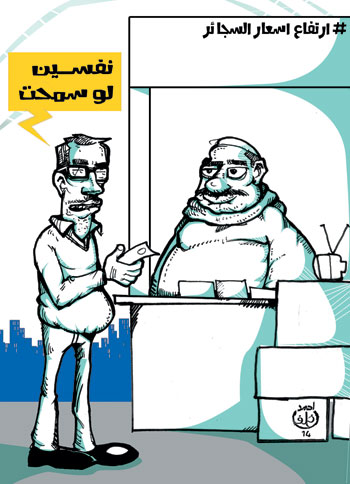 Catch up on the latest out of Egypt every week, with analysis, news updates, photos, videos, and more.
Catch up on the latest out of Egypt every week, with analysis, news updates, photos, videos, and more.
Quote of the Week
“Are you afraid that the president will talk to his people?”
— Former President Mohamed Morsi at his February 16 trial.
Morsi’s defense withdrew from the hearing earlier in protest against the glass cage in which the defendants are being held during the sessions. The defendants said they could not hear the prosecutors, but the head of the court insisted that the cage was not soundproof.
Egypt in the News
Tuesday
Ansar Bayt al-Maqdis claims responsibility for tourist bus blast which left four dead
Minister sacks Mahalla company president as textile workers strike hits day eight
Anan announces presidential bid; Popular announces Sabbahy’s electoral platform
Morsi’s defense team withdraws; Brotherhood leaders Qalyubeya trial postponed to February 20
Wednesday
Egypt expecting $9 billion in aid from Gulf states: Al-Ahram
Prosecution interrogating Saint Catherine hikers, blocks transfer to Cairo
Mubarak appears in court; Embezzlement trial adjourned to March 19
Thursday
“Marriott Cell” case of twenty journalists postponed to March 5
Three suspects apprehended in Taba bus blast
Prosecution makes surprise visits to Egypt prisons, reports few complaints
Friday
United States warns Egypt not to target media; Senator Tim Kaine meets Egyptian officials
Twenty-four injured, seven arrested in clashes between Ultras and security forces
Khaled Ali announces presidential bid; Meets with Sabbahy
On EgyptSource
Issue Brief: Egypt’s Labor Dilemmaby Mustansir Barma
Portrait of a Grave Dwellerby Sarah El-Rashidi
Why Egypt Matters to the UAEby Richard LeBaron
The Egyptian People Are Not Readyby Mohammad Tolba
In-depth
Preventing terror is a job for all | H.A. Hellyer, Daily News Egypt
“Earlier this week, a bomb attack on an Egyptian tourist bus took place in Sinai, taking the lives of three South Korean tourists, and one Egyptian driver. More were wounded in the attack, which was claimed the following day by the Ansar Bayt al-Maqdis (ABM) group as part of an “economic war” against Egypt’s military-backed government. A line, it would appear, has been crossed. But will that change the perspective of anyone involved in Egypt’s sordid story? Or will it merely entrench them in their own worldviews?
There are, as always, four main actors to consider in terms of the fall out. The first is the Egyptian state, particularly in terms of the security machinery and the military leadership, who, particularly in Sinai, are jointly responsible, operationally speaking, for security. The second is the political apparatus, which will remain responsible not only for executive decisions, but the messaging of the Egyptian state. The third are foreign governments, who remain connected to this particular security problem in so far as they may share intelligence with the Egyptian authorities, assist in certain types of operations and offer aid as well as training. Finally, the political adversaries of the state, formed in large part by the Muslim Brotherhood and the wider “Anti-Coup Alliance”.”
Sisi the Invincible | Eric Trager and Gilad Wenig, Foreign Affairs
“Sisi represents 180 degrees of ideological difference from Mohamed Morsi, the Muslim Brotherhood leader whom Egyptians elected less than two years ago and then toppled 12 months later. So it should come as no surprise if Sisi’s support quickly dwindles after winning the presidency and Egypt again sees mass protests. (It doesn’t help matters that, like virtually every other Egyptian political figure, Sisi has no apparent answers for the country’s significant economic woes, high youth unemployment, and exclusivist politics.)
Yet that doesn’t mean that Sisi will face the same fate as Morsi. Even if Sisi faces an uprising, there are good reasons to think he will be more durable than his ousted predecessors, as well as more durable than the other prospective candidates for Egypt’s presidency.”
Entrepreneurship for a Better Egypt | Dina Sherif and Salma El Sayeh, Middle East Institute
“Entrepreneurship and job creation have recently become buzzwords used by the country’s private sector and civil society leaders as a way to develop and stabilize Egypt. Numerous scholarly pieces and technical reports have been produced on the state of entrepreneurship in Egypt and the Arab world, on the necessity of entrepreneurship for fostering more inclusive economic growth, and on the region’s glaring unemployment rate. The focus on entrepreneurship is not surprising, given the role that it can play in tackling unemployment. A well-directed entrepreneurship ecosystem can offer a sustainable solution to the country’s most pressing socioeconomic challenges—unemployment and inequity—while at the same time sparking a culture of innovation.
Literature on what is needed to support an increase in sustainable and scalable start-up enterprises references several weaknesses in Egypt’s entrepreneurship ecosystem. These weaknesses range from issues with existing legal frameworks to the availability and accessibility of financing options to problems with the educational system.”
On Twitter: Four Killed in Attack on Tourist Bus in Taba
On Sunday, February 16, a suicide bomber attacked a tourist bus, killing three South Koreans and the Egyptian driver. Sixteen others were injured. Ansar Bayt al-Maqdis has since claimed responsibility for the attack.
Israel’s police spox says explosion in Taba was “terrorist attack.” Injured being treated right now by Egyptians http://t.co/m7KVcgAwmT
— David Barnett (@dbarn225) February 16, 2014
Security Camera Video of the #Taba bus explosion that claimed the lives of 4 today: http://t.co/HlDwuFjwuF via @mostafa#Egypt
— Mai El-Sadany (@maitelsadany) February 16, 2014
Targeting of civilians in Sinai is a worrisome shift, could be disastrous in mainland Egypt. Very odd location, being near the Taba crossing
— Michael Hanna (@mwhanna1) February 16, 2014
The madness on Twitter waits for no one. It’s either most definitely the MB or a flag operation by Egyptian intelligence. Ridiculous.#Taba
— Dalia Ezzat (@DaliaEzzat_) February 16, 2014
Months ago, officials boasted that tourism was safe because “Egyptian-Egyptian” violence didn’t target foreigners. Taba has changed that
— Tom Rollins (@TomWRollins) February 16, 2014
The U.S. Embassy condemns in the strongest terms the terrorist attack today in Taba. http://t.co/BabhEwY4fH
— US Embassy Cairo (@USEmbassyCairo) February 16, 2014
Taba bus attack may have meant to hurt the still viable religious tourism venue in #Egypthttps://t.co/v5tpXuoBbA
— salamamoussa (@salamamoussa) February 16, 2014
Cartoon of the Week

On the increase in cigarette prices: “Two puffs please” [Youm7]
Report: High Price of Dissent
Human Rights Watch (HRW) released a new report on a recent crackdown by Egypt’s interim government on freedom of speech:
Egyptian authorities in recent months have demonstrated almost zero tolerance for any form of dissent, arresting and prosecuting journalists, demonstrators, and academics for peacefully expressing their views.
“Journalists should not have to risk years in an Egyptian prison for doing their job. The prosecution of these journalists for speaking with Muslim Brotherhood members, coming after the prosecution of protesters and academics, shows how fast the space for dissent in Egypt is evaporating,” Joe Stork, deputy Middle East director for Human Rights Watch (HRW) says.
Image: Photo of the Week: Fans of Egypt's Al-Ahly, known as "Ultras", show a 3D figure of former player Mohamed Abo Trika during the team's African Super Cup soccer match against Tunisia's CS Sfaxien at Cairo Stadium February 20, 2014. Al-Ahly won the match. Reuters/Amr Abdallah Dalsh
